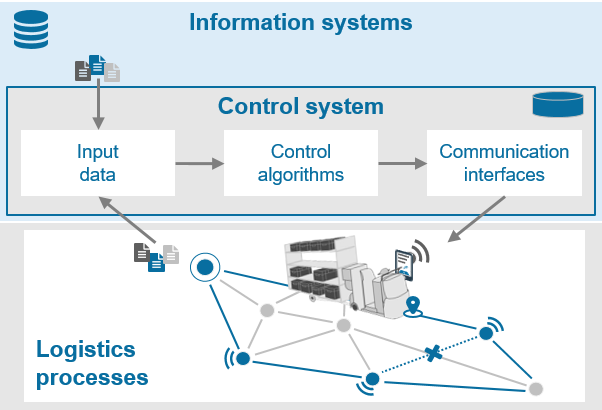Milk-Run systems enable high-frequency and efficient provision of material in production and assembly areas from storage areas. Today, they usually run on predetermined routes between a station (source) and at least two points of demand (destinations) according to a fixed schedule. Milk-Run systems are therefore particularly suitable for a high number of demand points, large distances between the destinations, constant throughput and a constant supply frequency. In practice, however, it can be seen that transport demands for the supply of mixed-model assembly lines with a wide range of variants are subject to strong fluctuations. Fluctuations in transport demands occur due to the following causes: 1) product variety and fluctuations in the production program, 2) stochastic fluctuations due to different container ranges, and 3) unknown and fluctuating time span between consumption and demand triggering.
The result of the demand fluctuations is that in static Milk-Run planning with fixed routes and schedules based on average material consumption, either less or more material has to be transported than defined in the planning process. If peaks in transport demand occur at certain times, a delay in the provision of material must be expected in operations, or time-consuming and cost-intensive extra tours must be arranged. In order to avoid late deliveries or extra tours, excess capacities are required. As a result, however, the Milk-Run system is not used to full capacity in phases with low transport volumes and the system cannot be operated efficiently.
One approach to dealing with fluctuating transport demands is the dynamic control of Milk-Run systems. Tours and routes are continuously recalculated on the basis of real-time data from the process and distributed to the resources available in the system. For the implementation of dynamically controlled Milk-Run systems, algorithms for dynamic routing are currently being developed. In addition to suitable control algorithms, the technical and organizational design of dynamic Milk-Run systems must also be considered.
The research project investigates the effects of dynamic control approaches on the procedural, organisational and technical design of route train systems. The aim is to develop a methodology for a holistic design and evaluation of dynamic Milk-Run systems in industrial environments considering different control, process and technology options.
The methodology should enable users to compare different control and process variants as well as different technical implementation variants on the basis of quantitative and qualitative factors and to select the optimal solution depending on the application scenario.
The research project in cooperation with MAN Truck & Bus SE is divided into four work packages. The first work package examines existing Milk-Run systems for fluctuations in transport demands, existing control principles and technical implementation variants. The aim is to define requirements for the implementation of dynamic Milk-Run systems. Parallel to the current state analysis, a literature and technology review on the current status of digitization and automation in Milk-Run systems is carried out.
In the second step, the required methodology for the holistic design and evaluation of dynamic, networked Milk-Run systems is to be developed on the basis of the derived requirements and the technology research. First, description models for the different process variants for material and information flow as well as for the different technical implementation variants are derived depending on the dynamic control strategy. Subsequently, a methodology for dimensioning and holistic evaluation of the various planning variants will be developed.
In the third work package, the developed methodology is implemented in a user-friendly planning tool. The evaluation of the tool by users in industry takes place in the last work package.
